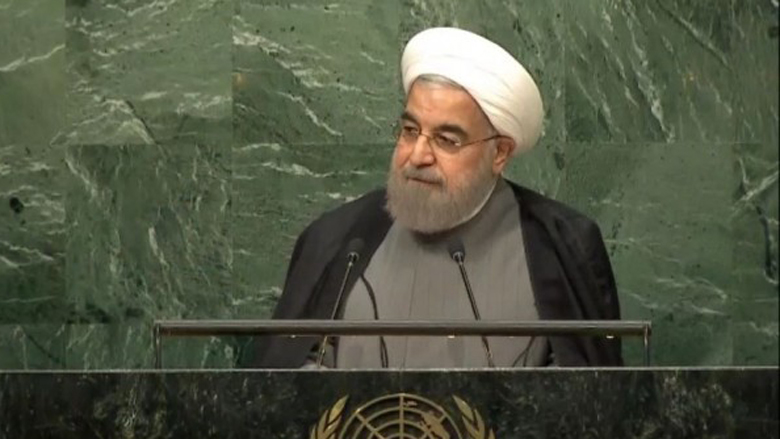Rouhani slams Saudis and ‘Zionists,’ accuses US of not complying with nuclear deal
By CNS News | September 23, 2016, 6:19 EDT
 Iranian President Hasan Rouhani speaks at the U.N. General Assembly Thursday in New York on Thursday, September 22, 2016. (UN Photo)
Iranian President Hasan Rouhani speaks at the U.N. General Assembly Thursday in New York on Thursday, September 22, 2016. (UN Photo) (CNSNews.com) – Addressing the U.N. General Assembly Thursday, Iranian President Hasan Rouhani had harsh words for “the usurping Zionist regime,” Saudi Arabia and the United States, whose policies in the region he accused of fueling terrorism. He also accused the U.S. of not complying with the nuclear deal, and said this would further erode its international credibility.
But the representative of a regime which the U.S. still views as the world’s foremost sponsor of terror ended by voicing optimism that moderation and peace would triumph over extremism and violence.
Rouhani blamed the post-9/11 security and foreign policies of “major powers” for the rise of “borderless” terrorism.
On the day of the al-Qaeda attack on America in 2001, he said, “no one imagined that this occurrence would lead to larger disasters, resulting in a devastating war in the Middle East and the spread of insecurity across the globe. This war has sown the seeds of borderless terrorism everywhere on earth.”
“The genesis of borderless violent extremism and terrorism could be attributed to the security strategies developed by major powers in the past 15 years,” Rouhani said.
In his first speech to an international audience since the Joint Comprehensive Plan of Action (JCPOA) nuclear deal entered into force last January, Rouhani characterized the agreement as evidence that Iran’s nuclear program had been misrepresented by its foes. He also noted that the agreement had left Iran’s right to enrich uranium intact
The deal, he said, “confirmed the peaceful nature of Iran’s nuclear” and “put an end to unfounded concerns.”
“We should never forget that pressures, sanctions and illegal threats against the Iranian people, which sought to fully dismantle Iran’s enrichment program, were all defeated.”
Meanwhile Rouhani accused the U.S. of failing to comply with the JCPOA, and said this would “further erode the credibility of the United States in the world.”
And taking aim at a U.S. Supreme Court ruling in favor of congressional steps in support of American families of victims of Iranian terror, he said the actions of “Zionist pressure groups” had led Congress to pass laws forcing the country’s highest court to violate norms of international law.
On Israel, Iran’s primary enemy, Rouhani accused it of carrying out “apartheid policies and atrocities” against “the oppressed Palestinians.”
Iran’s reviling of Israel is not new, but after a year marked by bitter exchanges with Saudi Arabia it was the Sunni kingdom that attracted the most critical treatment in the speech.
Saudi Arabia and Shi’ite Iran have been at loggerheads over a deadly stampede during last year’s pilgrimage to Mecca, and are supporting opposing sides in the civil wars in Syria and Yemen.
Alluding to allegations of Saudi and other Gulf state support for radical Sunni groups fighting in Syria, Rouhani said the same countries that provided overt and covert support for such groups “are now committing atrocities against innocent people and their defenders under the guise of fighting terrorism.”
“Certain countries must stop bombing their neighbors,” he said, in a clear reference to the Saudi airstrike campaign against Houthi rebels in Yemen.
“If the Saudi government is serious about its vision for development and regional security, it must cease and desist from divisive policies, spread of hate ideology, and trampling upon the rights of neighbors, accept its responsibility for the protection of the lives and dignity of pilgrims and construct its relations with the nations in the region on the basis of mutual respect and accountability,” he said.
The Syrian civil war and rise of ISIS has fanned the flames of sectarianism across the region, and political and religious figures in both Iran and Saudi Arabia have been accused of pouring oil on the fire through their policies and rhetoric.
In an address in New York one day earlier, Saudi Crown Prince Mohammed bin Nayef accused Iran of supporting “terrorists” in Bahrain, Kuwait, Yemen, Iraq, Syria, Lebanon and elsewhere, and of spreading sectarian hatred.
Rouhani hit back on Thursday, saying while Iran “opposes any kind of sectarianism” the fault lay with others.
“Attempts to turn religious dissimilarities into tense confrontations is rooted in vested interests of certain countries, which try to hide their quest for power covered in religious slogans,” he declared.
Rouhani concluded his speech by expressing optimism that “moderation will prevail over extremism, peace will triumph over violence, enlightenment will overcome ignorance, and finally justice will rise above injustice.”
— Written by Patrick Goodenough











